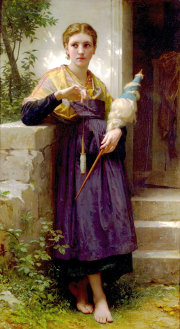|
Home
|
Sep 6, 2010
This week's themeWords related to spinning This week's words distaff spinster dizen subtile homespun 
Girl with spindle and distaff
Art: William-Adolphe Bouguereau (1825-1905)
 Discuss
Discuss Feedback
Feedback RSS/XML
RSS/XML
A.Word.A.Day
with Anu GargWhat's common among a disc jockey, a spider, a PR agent, and a cricket bowler? They all spin. But this week we are talking about a different kind of spinning, the original kind: the spinning of yarn. Before modern textile mills, and before specialization, people used to spin yarn and weave cloth at home. Even though a typical home doesn't have raw flax and wool any more, that era has left its imprint on the language. By looking at these terms in the English language we can tell who used to do the spinning, and what was thought about people related to the job. This week we'll see five words relating to spinning that are now mostly used figuratively. distaff
PRONUNCIATION:
(DIS-taf)
MEANING:
adjective:Of or relating to women. noun: 1. A staff for holding flax, wool, etc. for spinning. 2. Women considered collectively. 3. A woman's work or domain. ETYMOLOGY:
From Old English dis- (bunch of flax) + staef (stick).
NOTES:
A distaff is a staff with a cleft for holding wool, flax, etc. from
which thread is drawn while being spun by hand. In olden times, spinning
was considered a woman's work, so distaff figuratively referred to women.
Distaff side (also spindle side) refers to the female side of a family. The
corresponding male equivalent of the term is spear side (also sword side).
USAGE:
"Volvo's gender politics are distinctly distaff, with safety and familial
obligation easily trumping the sorts of values cherished by the aroused
arrows of the world."Dan Neil; Herr Doktor, Your Ride is Here; Los Angeles Times; Mar 3, 2004. See more usage examples of distaff in Vocabulary.com's dictionary. A THOUGHT FOR TODAY:
The world is mud-luscious ... puddle-wonderful. -E.E. Cummings, poet (1894-1962)
|
|
Subscriber Services
Awards | Stats | Links | Privacy Policy
Contribute | Advertise
Awards | Stats | Links | Privacy Policy
Contribute | Advertise
© 1994-2026 Wordsmith